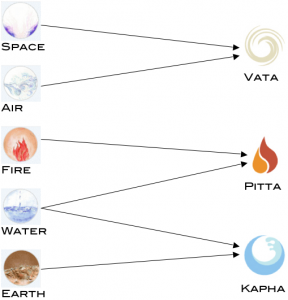I’ve been preparing to make a presentation on ayurveda to some fellow yogis! Much of what I’ll be doing as an ayurvedic wellness counselor is educate people on ayurveda. I hope to take the experience of this first presentation and run with it! Continue with workshops and seminars and share how ayurvedic principles can really help people live healthier more vibrant lives.
In this post I began to describe what ayurveda is. As I have progressed in my studies I think it’s time to get more into the details!
So much of learning about ayurveda first has to do with understanding the way it sees the universe/ world view and the vocabulary it uses to talk about it. Yoga and ayurveda share the same philosophy as they come from the same volumes of knowledge compiled by sages of the Vedic age from the Indo-European region that is now India. All the literature together is referred to as the Vedas. The Sanskrit word “veda” translates to “science” or “wisdom,” and the word “ayur” translates to “life.” Simply put, ayurveda is the science or wisdom of life.
The philosophy on which ayurveda is based is called Samkhya Philosophy. There is belief in a cosmic intelligence, and that everything is made up from the same building blocks and therefore everything is connected. All of the matter and energy around us is made up of five elements: space, air, fire, water, and earth. Today we have the periodic table of elements, but back then they relied on a more simple and intuitive approach in observing everything around them and how it affected their being – mind, body and spirit. We are a product of our environment and everything we ingest. A healthy person enjoys balance on all levels: mind, body, spirit. Balance requires awareness of how experiences, everything you take in, affect you. Ayurveda takes a consciousness-based approach to health, with mind, body, and spirit fully integrated.
The five elements combine to give us many things, including the three doshas. The doshas are energy as described through three categories: vata, pitta, and kapha. We see the effects of these energies in our bodies, the seasons, and even the hours of the day.
In the broadest sense, vata is the force that causes movement and wears things down. You can read more about vata energy, it’s qualities and effects in this post. Again, speaking in the broadest terms, pitta is the force of transforming and sustaining, and kapha is the force that brings stability, creates and builds.
Spring is Kapha season. Stay tuned for an in depth look at Kapha!
Remember that ayurveda starts out as a language, then turns into awareness. Awareness of how everything around you affects you, and you have a language to describe it. Ayurveda is not just about what foods to eat and herbs to take, it’s about knowing yourself. Health is a byproduct of enlightenment.







I hope you write more about Ayurveda. There is so much info on the net I don’t know what to believe. My hsabund and I took a trip to India a little over 1 year ago and we are in love with the food, culture, and the way of living. When we returned from India we maintained the veg diet for some time, until we succumbed to Western ways again. I would like to begin to follow an Ayurveda lifestyle to optimize health. I hope you have something in the works about Ayurveda.
Hi Andrielly! Thanks for reading! I hope to pick up on writing more posts soon! I know what you mean about so much information being on the web, often contradicting information, thats what let me to study Ayurveda for myself. The truth is that everybody is different, but Ayurveda can really help you get a good knowledge of yourself and then recommend how to best care for yourself: mind, body, and spirit! First step is to know your Dosha (mind/body constitution). Anyone can thrive on a vegetarian diet, but some people, especially if they are a highly Pitta person may benefit from incorporating quality meats in their diet.
Sign up for my newsletter, that way you can get updates from my blog once a month straight to you inbox! I’d love to help you figure out what your dosha is and give recommendations to help you feel your best 🙂